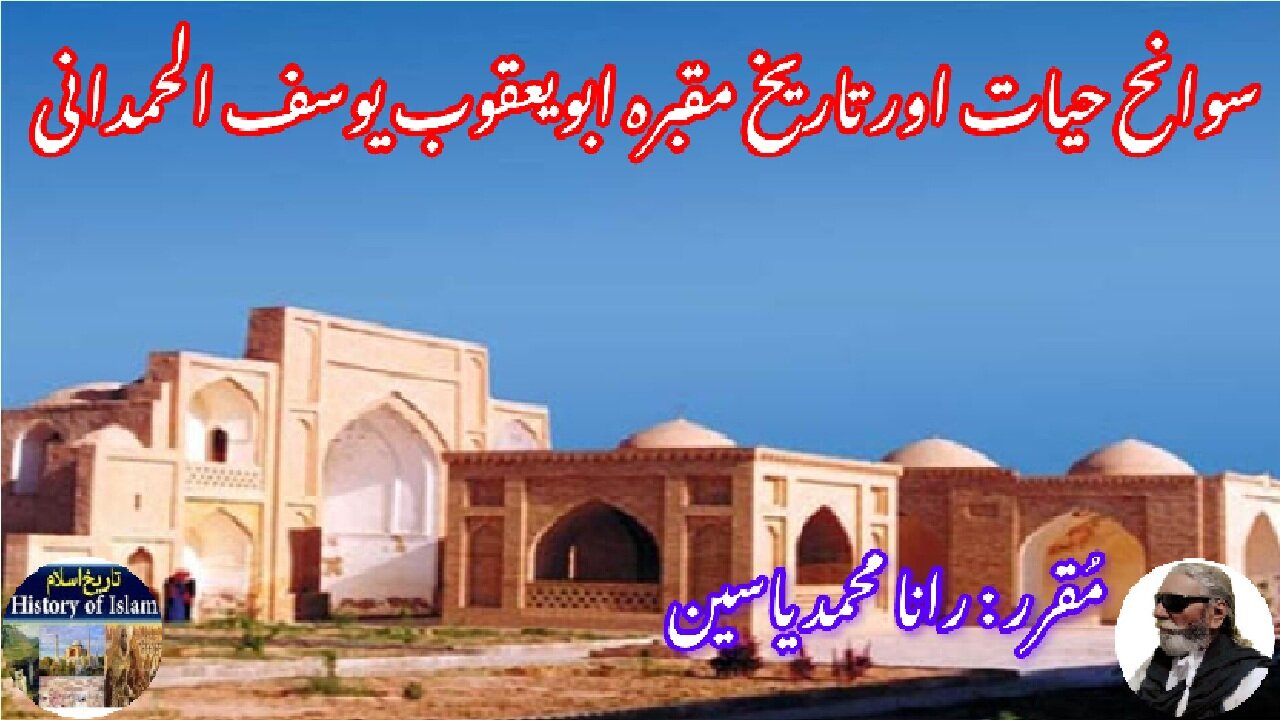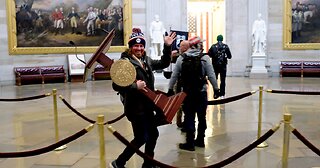Premium Only Content

Abu Yaqub Al-Hamadani & shrine अल-हमदानी ابو یعقوب یوسف الحمدانی کی سوانح عمری اور مزار کی تاریخ
@islamichistory813 #sufisaint #culturalheritage #biography #abuyaqubyusuf #alhamadani #islamicmysticism #islamicphilosophy #shrine #historicalfigures
Biography of Abu Yaqub Yusuf al-Hamadani and the history of his shrine
Dekhti Aankhooon aur sountay kaanoon ko Asslamoalaikum, sisters, brothers friends and elders, in informative series videos of Islamic ascolars, sufisaints, cultural heritages, islamic philosophys, islamic mysticisms and historical figures. today we are describing biography of Abu Yaqub Yusuf al-Hamadani and the history of his shrine.
Abu Yaqub Yusuf al-Hamadani, best simply known as Yusuf Hamadani, was a Persian Sufi of the Middle Ages. He was the first of the group of Central Asian Sufi teachers known simply as Khwajagan (the Masters) of the Naqshbandi order. His shrine is at Merv, Turkmenistan.
Born in Buzanjird (Bozineh Jerd) near Hamadan in 1048 or 1049, he moved to Baghdad when he was eighteen years of age. He studied the Shafi'i school of fiqh under the supervision of the master of his time, Shaykh Ibrahim ibn Ali ibn Yusuf al-Fairuzabadi. He kept association in Baghdad with the great scholar, Abu Ishaq al-Shirazi, who gave him greater deference than to any of his other students although he was the youngest. But he was a Hanafi Maturidi unlike his teachers.
According to Ibn Khallikan, he began his religious career with the cultivation of the religious sciences, becoming both a respected scholar of hadith and fiqh and a popular preacher in Baghdad. He was so brilliant a jurisprudent that he became the Marja of his time for all scholars in that field. He was known in Baghdad, the center of Islamic knowledge, in Isfahan, Bukhara, Samarqand, Khwarazm, and throughout Central Asia.
He was a scholar of the ?anafi school and followed the Supreme Im?m, Ab? ?an?fa, while his shaykh was a Sh?fi‘? scholar. He was trained in the mystical sciences by Shaykh ?asan Simn?n?, Shaykh ‘Abd-Allah Juwayni, and finally by Khwaja Abu-‘Ali Farmadi.
He lived sometimes in Merv (Turkmenistan) and sometimes in Her?t (Afghanistan). He spent sixty years of his life in preaching and providing spiritual guidance. His extraordinary knowledge of esoteric and exoteric knowledge made him popular throughout Central Asia. His khanqah in Merv was so renowned, it was called the “Ka‘bah of Khurasan.” It was always full with numerous seekers and mur?ds; no other kh?nq?h had so many attendees. Samani says no other khanqah received so many seekers as the khanqah of Khwaja Yusuf.
He was the keeper of the staff and turban of Sayyidina Salman Farsi radiyAllahu ?anhu.
He was the Ghawth of his time. Some scholars even consider him the Mujaddid of the sixth century instead of Im?m Ghazali. Ghazali was a prolific writer and left a huge collection of writings. Khw?ja Y?suf was the ultimate shaykh and spiritual mentor, whose students founded some of the largest Sufi Orders (including Naqshbandi, Yasavi, Qadri and Chishti).
Several notable scholars and Sufi masters benefited from his noble company and guidance. Shaykh ‘Abd al-Qadir Jilani used to stay in his company. Khwaja Muin ad-Din Ajmeri also stayed with him for six months. ?akim Sanai, a famous Persian Sufi poet, visited Khwaja Yusuf and affiliated himself to the Khwaja, and stayed with him for some time.
He was a pious Imam, putting his knowledge into practice. He was an authority for Muslims, possessor of lofty states and stations. He was the ultimate mentor for sincere disciples in Merv.
The author of Rasha?at praises him as follows:
He was endowed with profound rapture and charismatic talent. Over a vast area, stretching from Baghd?d to Samarqand, people would flock to visit him, in order to derive benefit from his holy breath.
He visited Baghdad in 506 AH, where he delivered public sermons and provided spiritual guidance. Shaykh ‘Abd al-Qadir Jilani also accompanied him and described his first meeting in the following words:
A man came to Baghdad from Hamadan, called Y?suf Hamd?ni. I heard he was a Qu?b. He stayed at a rib?? (Sufi center). When I heard about him, I went to the rib?? but did not find him. When I asked around, I was told he was in the cellar. I went down to him. He stood up when he saw me, then sat down close to me. He described my state of affairs [a?wal] and resolved all my obstacles. Then he said to me: “O ‘Abd al-Qadir! Address the people.” I said: “O my master! I am a non-Arab person, how can I speak to the eloquent people of Baghdad” He said: “You have now mastered (the sciences of) jurisprudence, the principles of jurisprudence, argumentation [khilaf], grammar and language, and Quranic exegesis. It is now time to speak. Sit on the chair and speak to the people, for I see in you a root that will soon grow into a large tree.”
One day the shaykh was addressing the people. Two literalist jurists, who were ignorant of spiritual secrets and realities, said to him: “Keep silent, you are devising innovations [bid‘ah].” The shaykh replied: “You should be silent, you may not live.” They both immediately fell dead.
Once a boy from the region of Hamad?n was captured and taken away by the Romans. His mother came crying to Khw?ja Yusuf and told him about it. The Shaykh asked him to be patient, but she cried and said I can’t have patience, my son has been taken away from me. The shaykh supplicated to the Almighty Lord:
“O All?h! Free him from captivity and quicken his release.”
The shaykh told her to return home and find her son there. The woman returned and saw that her son was already at home. When asked, the boy said he had just been in Constantinople, held captive and under guard, but suddenly a person appeared and instantly carried him back home. The mother later told this enthusiastically to the shaykh, who replied: “Do you wonder about the authority of God”
Once Khw?ja ?asan Andaqi entered a special state of ecstasy and went into a state of seclusion from the world, including his business and home. When Khwaja Y?suf noticed his situation, he advised him in the following words:
“You are a poor man, with a wife and children to support. You have a personal obligation to attend to their basic needs, the neglect of which is neither reasonable nor in accordance with the Sharia.”
Masters of the Naqshbandi Order do not approve social seclusion in the name of spiritual exercise and have always encouraged their followers to fulfill their social responsibilities with utmost care.
Once a dervish came to Khw?ja Y?suf and said: I had been in the assembly of Shaykh A?mad Ghaz?l? who was eating together with his mur?ds that suddenly he entered a state of absorption and trance; afterwards the Shaykh said that just now the Master of the Universe (Holy Prophet) sallAllahu alayhi wasallam appeared and fed me a mouthful. Khw?ja Y?suf replied: “These are imaginations for nurturing the kids of the Spiritual Path.” He meant that such visions are signs of the beginning, not perfection.
He said:
Spiritual Hearing [Sima‘] is an ambassador from God and a bearer of glad tidings. It is food for the souls, nourishment for the bodies, life for the hearts and stability for the secrets. It is the unlocker of secrets, (like) the bright lighening and the luminous sun.
[Sima‘ in those times was a Sufi gathering where dervishes listened to a singer who would sing Naats, hymns and spiritual couplets without music, while others would listen intently. Later on, some Sufis added light music in Sima‘.]
Once he said to his mur?d Ab?-Sa‘d: “I advise you: do not visit the kings, and always make certain that what you are eating is not ?ar?m.”
Some people asked him: “What should we do when the Friends [awliya’] of All?h depart from us?” He said: “Recount their speeches.”
He passed away during a journey from Her?t to Merv, in a small town called B?miy?n. During his last moments, Khw?ja Y?suf asked his deputy A?mad Yasav? to recite the chapters Y?s?n and al-N?zi‘?t from the Qur’?n. After living for more than ninety years, he died on Monday 22 Rab?‘ al-Awwal 535 AH (4 November 1140).
He was initially buried in that town, later his blessed body was transported to Merv (Turkmenistan) by one of his disciples Ibn-Najj?r and he was reburied there. His tomb in Merv has been a place of pilgrimage for the spiritual seekers.
He was well versed in Persian and Arabic but apparently did not speak Turkish. He wrote a number of treatises, one of them Rutbat al-?ayat (Persian) has been published. Other known treatises include Manazil al-Salik?n and Manazil al-Sairin.
The Turkish television series Mavera: Hace Ahmed Yesevi is based on the life of poet Ahmad Yasawi (portrayed by the Turkish actor Korei Cezayirli), who was sent to Baghdad by his murshid (spiritual guide) Yusuf Hamadan
With this, we seek your permission until tomorrow, tomorrow we will describe the biography of Scholar Mir Sayyid Ali Hamadani and the history of his maqbara. Allah Hafiz.
=========================
-
 LIVE
LIVE
Jesús Enrique Rosas
1 hour agoEp. 55: Trudeau RESIGNS, Starmer is SHAMELESS, Biden's DISGRACE, Kamala IGNORED and MOAR!
698 watching -
 LIVE
LIVE
The Charlie Kirk Show
44 minutes agoTrump's Return Certified + The Fall of Trudeau + Britain's Grooming Gangs | 1.6.2025
12,860 watching -
 LIVE
LIVE
Grant Stinchfield
52 minutes agoHead Movement, Signal Account Change & More... The Cybertruck Bomber Mystery
149 watching -
 LIVE
LIVE
Dirty Old Plumber games
3 hours agoStar Citizen
145 watching -
 LIVE
LIVE
Father Russell
1 hour agoDelta Force | Stream Restart | Connection Issues
187 watching -
 1:00:33
1:00:33
The Dan Bongino Show
3 hours agoThe Trump Administration Can't Start Soon Enough (Ep. 2394) - 01/06/2025
584K1.47K -
 50:59
50:59
Rebel News
3 hours ago $10.68 earnedLIVE: Surprise Trudeau press conference, expected to resign after pressure
35.9K86 -
 1:01:07
1:01:07
The Rubin Report
2 hours agoBill Maher Rips Into Hollywood Star for Defending This Ugly Aspect of Islam
41.5K15 -
 LIVE
LIVE
vivafrei
3 hours agoJan. 6 Pardon Panel Live Stream - WATCH AND SHARE!
4,237 watching -
 LIVE
LIVE
The Shannon Joy Show
4 hours ago🔥🔥MUZZLED!!! The Censors Are BACK On Twitter As Elon Ramps Up Speech Codes!🔥🔥
292 watching